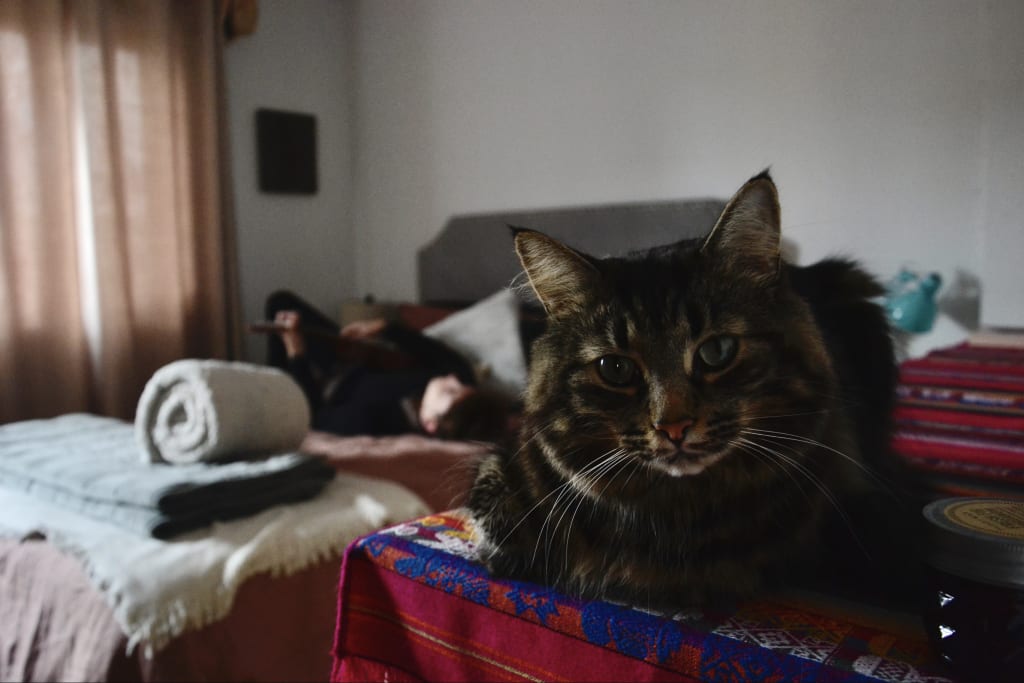
I used to convince myself that love did not exist—or at least that I was incapable of feeling it. I used to tell myself true love was a myth, that the closest thing to true love was motherly love and I knew too well that even motherly love was not the unconditional, beautiful concept everyone had made it out to be. The truth is, my cynicism was simply one of the several mechanisms in place to avoid getting hurt. After all, it was Sappho who said, “She who loves roses must be patient and not cry out when she is pierced by thorns.” Thus I concluded, if I do not love, I cannot get hurt. So I went about my life cautiously, only investing into my relationships as much as I thought the other person was investing into me. I kept my distance and kept my guard up. Of course, I had friends and romantic partners but I tried my best to remain emotionally detached, reminding myself that in this life, you are fundamentally alone. I got hurt anyways. Ultimately, humans are social creatures; it is in our nature to seek others. Therefore, even despite putting up an emotional barrier between yourself and the rest of the world, our craving for closeness will eventually break the barrier and the pain of loneliness will find you.
This year, I decided to open up my mind and heart; I had found a person I wanted to love—even if it meant that I would eventually get hurt. What was a solid friendship turned into a solid partnership and I found my care for this person growing greater everyday. For the first time, I let go of my ego. I did not hide any part of myself; I let myself be vulnerable. In return, they never passed judgement, cared deeply, and loved passionately. I realize now that despite all my cynicism I fell victim to the popular notion that love is like a fairy tale. I idealized love, which is why it was so easy for me not to believe in it. However, love is not some magical emotion; love is a verb.
Erich Fromm, in all his dry heteronormativity, triggered a lightbulb to go off inside my head: love should be practiced. I am very familiar with the concept of practicing—I am a musician, after all. I began to think: what does it mean to practice? There involves a whole lot of dedication, motivation, and frustration. There are days where you want to give up and days where you could not possibly imagine doing anything else. There are days where you sit for hours crying in the practice room and days where, in realizing your progress, you feel like you are floating. I thought to myself, if I know how to practice music, then surely I can figure out how to practice love.
Almost everybody has an opinion on what a (romantic) relationship should be like. Some say it should be easy, others say it involves a lot of work. In reality, I think it lies somewhere in the middle; it should not be hard, and any work it does involve should be something that you want to do. As with practicing anything, there will be good days and bad days but if it is a good relationship, the good will always outweigh the bad. Upon reflecting on my current romantic relationship, I can see Fromm’s basic elements of care, responsibility, respect, and knowledge. With these elements in mind, It is clear to me now that love is not all passion and eros. True love is gentle. It is spending hours in the same room without saying a word but simply being content in others presence. True love is asking if you have taken your medication every day because they care about you and they know you forget. It is reminding each other to drink water. True love is sharing sadness. In my romantic relationship, there exist Fromm’s basic elements of care, responsibility, respect, and knowledge.
I do not have much interest in eros as the firey, passionate desire it is known to be. This probably has a lot to do with my sexuality (which is complicated to say the least, but for simplicity’s sake, we shall say demi-pansexual). For Socrates (and Diotima), the first rung on the Ladder of Love is the body; lust. As a demi-pansexual, lust for a body is not something I experience. I am attracted to minds and souls; genders, sexes, and good looks are external characteristics and the people I am attracted to do not have to fit any specific requirement as far as their bodies are concerned. If I do not lust for a body, can I still climb the ladder? In other words, without lust, is eros possible? I would like to believe that it is, I simply have the rungs in a slightly different order. That being said, in my opinion, the presence of eros in a relationship is not nearly as important as the presence of philia.
It truly baffles me how many people believe that your romantic partner is not a friend. “They are more than a friend,” someone explained to me when I brought this up. If they are more than a friend, should they not first be a friend? My partner is my best friend, despite not being the same sex, I believe we have good philia. Our friendship is one that goes deep; it has aspects of utility, pleasure, and goodness. We are constantly striving to be helpful for each other because our care is strong, we laugh, enjoy each other’s presence and are overall very happy together, in addition we are constantly motivating each other to be the best people that we can. I tell them everything, and they reciprocate. We are also similar in many ways—something which Aristotle values. We both value friendship, honesty, communication, and equality, we both are passionate about music and through our relationship have developed many hobbies we do together. Philia is a love I understand much more easily than eros, which is why I am grateful that it is an important part of my romantic relationship.
Another common and baffling notion of love is the idea that you must love yourself before you can love anyone else. Self-love is a crucial practice for survival in this world, but in many ways it is much more difficult than loving anyone else. In my own experience with suicide and suicidal ideation, love has played an important role. For years, my suicidal thoughts were never carried out because of a mantra I would repeat to myself: “I can’t kill myself, my mother wouldn’t be able to survive the grief. I can’t kill myself, my brother would be devestated,” and several other variations. Even when I failed completely to love myself, it was the love of others that kept me alive. I loved my family and I knew that they loved me. Of course, when mental illness strikes, you can only go on thinking that way for so long; soon enough you will convince yourself that you are unlovable. Before each suicide attempt was carried through, I had convinced myself that I was loved by nobody, so when I woke up in the hospital, surrounded by friends and family, I was in a state of shock. It was inconceivable to me that there were people that loved me, and yet they were right there in front of me telling me so. There are many people who loathe themselves so voraciously that the idea of self-love for them is unfathomable. These are the people we must love whole-heartedly and make sure to tell them so. The more you love them, little by little they may learn to love themselves. Furthermore, many people believe that “to love others you must first love yourself.” I do not believe that to be the case. There are people who have received very little love in their lives, or else have convinced themselves that they are not loved and yet they can still practice love. bell hooks would argue that this is in fact not love, but cathexis. However, I like to think that if you make up your mind to practice love, you can do so despite not receiving any in return.
My grade 8 teacher used to tell us, “You’ll know when you’re in love.” Even then, I would think that I could never be in love but now, looking at my partner, I am reminded by how Mr. M would talk so passionately about his wife and kids, saying that being in love did not give you butterflies or consume your soul; it was not something he could really explain, but it felt amazing. I understand now: your heart does not skip a beat every time you look at your partner, instead, it goes back to normal. Being with them calms you, it is warm and comforting. Wherever you are, if you are with them, you are home. In general, I think the concept of eros as true love is ludicrous; eros is wild, irrational, and violent. Love, genuine love, is gentle and, although I do not know how to accurately describe it, it feels amazing.
Bibliography
Aristotle. The Nicomachean Ethics. Trans. W.D. Ross. Kitchener: Batoche Books, 1999.
Broumas, Olga. Rave: poems, 1975-1999. Michigan: Copper Canyon Press, 1999.
Buscaglia, Leo. Love. New York: Fawcett Crest, 1978.
Fromm, Erich. The Art of Loving. London: Bradford & Dickens, 1957.
Plato. The Symposium. Trans. Christopher Gill. Penguin Classics, 2003.
About the Creator
Llin Owen
2020 grad of B.A. Honours in Music, minors in Fine Arts and Psychology, I am trying to find my place in this crazy messed up world. I write songs, stories and reflective opinion pieces usually based on mental illness, sometimes fantastical.






Comments
There are no comments for this story
Be the first to respond and start the conversation.